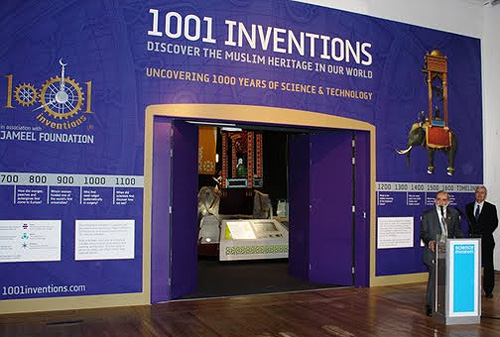Coffee, computers and piston engines - could we imagine a world without them? These are intricate parts of every day life for most of us and the knowledge that led to them was either invented by or passed down through the ancient Muslim world. That is the theme of an exhibit in London's Science Museum and it's a far cry from the view held by some that the Muslim and Western World represent a "clash of civilizations."
The exhibition, called 1001 Inventions: Discover the Muslim Heritage in Our World, traces the forgotten story of a thousand years of science from the Muslim world, from the 7th century onwards. The free exhibition, which runs from the 21 January to 25 April 2010, will look at the social, scientific and technical achievements that are credited to the Muslim world, whilst celebrating the shared scientific heritage of other cultures.
Featuring a diverse range of exhibits, interactive displays and dramatisation, the exhibition shows how many modern inventions, spanning fields such as engineering, medicine and design, can trace their roots back to Muslim civilisation.
Prof. Chris Rapley, Director of the Science Museum, commented: “The thousand year period from the 7th century onwards was a time of exceptional scientific and technological advancement in China, India, Persia, Africa and the Arab world. This is the period in history that gave us huge advances in engineering, the development of robotics and the foundations of modern mathematics, chemistry and physics. With over 15,000 objects in our collection spanning many different cultures, the Science Museum provides the perfect context for this exhibition, as a place which encourages innovation and learning amongst visitors of all ages.”
Even coffee makes it into the exhibition, as is was first developed as a drink - in the Arabian Peninsula, in today's Yemen. Professor Salim al-Hassani of the University of Manchester and Chairman of the 1001 exhibition says the coffee beans were actually brought to Yemen from the Horn of Africa, from Ethiopia. "Well of course, coffee was invented in the very early years of Islam - a guy called Khaled in Ethiopia, a young man looking after his sheep," al-Hassani said. The sheep seemed to like the beans. So the young man took the beans to Yemen - the story goes - and the drink was developed and spread like wildfire.
And there were many other inventions or innovations passed on by the early Muslim world from the 7th Century onward, says Hassani. "One of them is the invention of the university. This was done in the year 850 by a young lady called Fatima al-Fihri in the city of Fez in Morocco," al-Hassani said. "The first university as we know it in the world, giving degrees and so on."
Some says these important achievements have been forgotten amid the news often coming out of the Muslim world today that focuses so much on strife and terrorism. But, ask just about anyone on the streets of, say, Cairo or Damascus today and they haven't forgotten - they'll readily tell you about Islam's glory days - not just its conquests but its cultural, scientific and technological innovations.
These advances came at the height of the Islamic empire's glory when it spread from the Middle East, across North Africa to southern Spain and beyond. A time when Muslim scholars and inventors were at the forefront, says Hassani. "During that time, there were enormous contributions in science and technology that we have forgotten about and that comes to us from other civilizations," al-Hassani said. "And, it came to use over a very important civilization and that is the Muslim civilization."
One of the focal points of the exhibition is a six-metre high replica of the ‘Elephant Clock’- a visually striking early 13th century clock whose design fuses together elements from many cultures and is featured alongside a short feature film starring Sir Ben Kingsley as Al-Jazari, inventor of the fabled clock.
Professor SalimAl-Hassani, explained: “The Elephant Clock is an early 13th century machine which gives physical form to the concept of multi-culturalism. This engineering marvel featured an Indian Elephant, Chinese Dragons, a Greek water mechanism, an Egyptian Phoenix, and wooden robots in traditional Arabian attire. It embodies cultural and scientific convergence of civilizations and is an appropriate centre-piece for an exhibition about the roots of science and technology.”
Anne Marie Brennan teaches forensic biology at London's South Bank University and is fascinated by these innovations. "Everybody has to love the elephant clock," Brennan said. "The elephant clock is wonderful because it is like a United Nations clock. It has all the elements of different civilizations and I like it as a scientist because it shows that science doesn't have to be boring and sterile and plain, but it can be decorative and it can also pay homage to the cultures that bring it forward."
Other exhibits featured in this interactive exhibition include:
- Model of an energy efficient and environmentally-friendly Baghdad house.
- A large 3 metre reproduction Al-Idrisi’s 12th-century world map.
- Model of Zheng He’s Chinese junk ship – originally a 15th century wooden super structure over 100 metres long.
- Medical instruments from a thousand year ago, many of which are still used today.
- Model of a 9th-century dark room, later called Camera Obscura, which Ibn al-Haytham used to revolutionise our understanding of optics.
The exhibition began on January 21st and drew 15 000 people in its first week. It will run until April 25th 2010, with a short closure between February 25th and 12th March 12th. Click here to go to the 1000 Inventions website.


